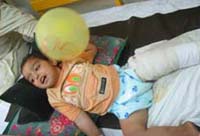
Children with bandages on their bodies, screaming and crying, cookies and toys beside their pillows, doctors and nurses rushing to treat those wounded, volunteers busy with offering help -- this is another busy day for Pakistani people who are racing against time to save the children rescued from the earthquake debris.
As the biggest hospital for children in Islamabad, Children's Hospital of Pakistan Institute of Medical Sciences has admitted up to 730 children from the quake-stricken areas. As the number of patients is rising everyday, the hospital's capacity is far from being enough.
"About 83 children have been discharged, and more than 700 are still in the hospital among whom 70 to 80 percent need operations soon. Due to limited space, we have to move some of the patients to other hospitals, but it's still very crowded. Even today we have received more than 100 injured kids," Dr. Adnan said.
"Children have more possibility to survive than adult since they can escape from death even there is only a small space, but most of the kids were injured on the head, arms and legs," he added.
According to United Nations Children's Fund (UNICEF), in the devastating 7.6-magnitude earthquake, tens of thousands of children have been injured, and others are separated from the families, putting them at risk. Nearly one fifth of the affected population are children under five.
"I don't know where my father and mother are. I want to go home," six-year-old Zanib said with bandage on her head.
Zanib is one of the nine children who survived the earthquake but she couldn't find her family members. She was badly injured on the head and she was sent to the hospital two days ago. Although she has received operation successfully, food and toys on her bed, a female volunteer accompanying her all the time, she still could not feel relaxed.
"We have many volunteers to help us take care of the children both physically and mentally, but the children really need time to pass through this hard time," said Dr. Adnan.
"We are trying to find her parents, but before we confirm the situation of her family, nobody can say she is an orphan or adopt her from the hospital," he added.
The Pakistani government has banned the adoption of orphans in order to prevent abuse and mistreatment of these children by certain elements of the society.
Danish is a three-year-old boy who was injured on the left leg, which is now wrapped with white bandage. His mother was sitting next to his bed, holding a balloon to amuse him. Danish is crying and crying in pain unless his mother put a candy in his mouth.
"Twelve of my relatives died in this earthquake, but fortunately my son was just injured, and my husband and I are healthy. We got everything here for free, living, food or operation. We are thankful for all the people who donated for us affectees," said Danish's mother.
She complained that no relief team has arrived in the area she lived in. "All the relief teams and supplies are in the city, but not in the small villages. We know that it's because of traffic or roads, but the relief work for outlying areas are really badly needed," she added.
The UN's Emergency Relief Coordinator, Jan Egeland said Friday that rescue work was facing the difficulty of how to reach the affectees in outlying areas.
"In the pipeline we have 10,000 tents and 100,000 blankets but it takes time to get them into these areas, and more aid is still on the way," Egeland said.
Volunteers are everywhere in or out of the hospital. Some of them are distributing donations for the patients, some are helping the doctors to take care of the injured kids. All of them are working round-the-clock.
Rahina, a 22-year-old girl who has been working as a volunteer in the hospital for three days, said 90 percent of her classmates have joined the relief work in different places as volunteers.
There is a big room in the first floor of the hospital filled with food, water, clothes and toys donated by people from all walks of life. And more donations are pouring in every day.
"Winter is coming, so food and blankets are very important for the patients. We still need a lot for distribution, but we will share some of the donations with other hospitals which also need them urgently. Although time flies, we will overcome the hardship with support of all the people," Tabassum said.
(Xinhua News Agency October 16, 2005)
|

